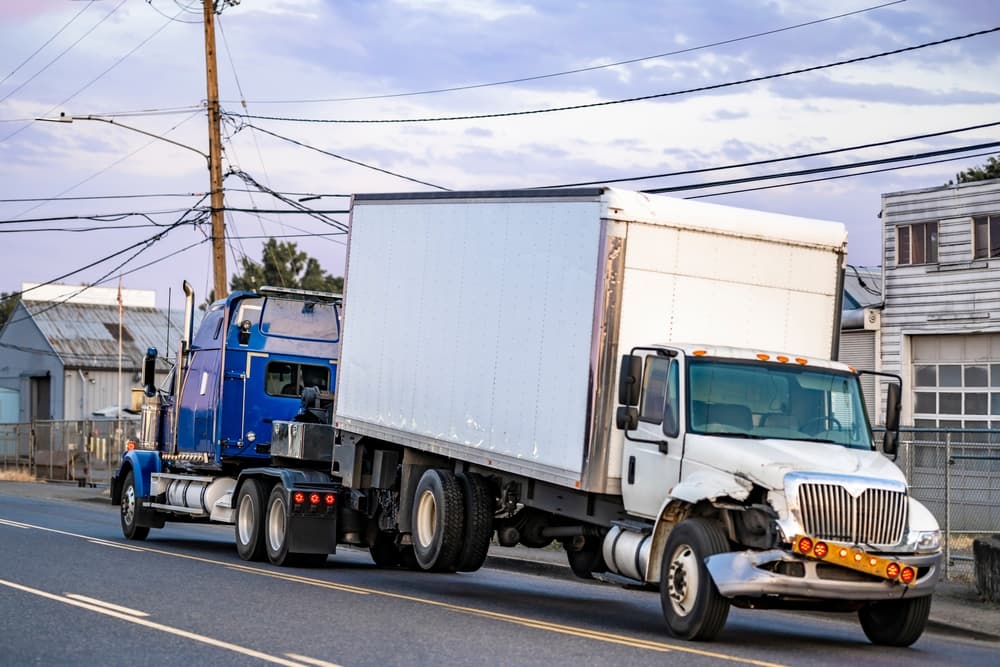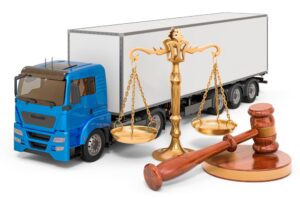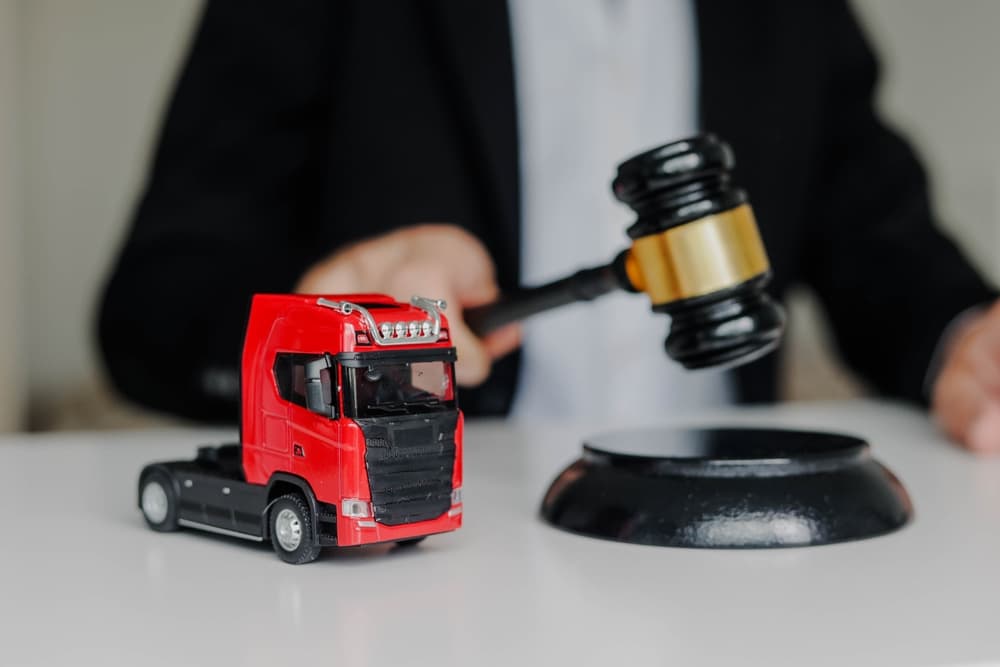Accidents involving large trucks often leave a devastating impact, both for those directly involved and for their loved ones. If another party’s negligence caused a truck crash that hurt you or a loved one, you're likely grappling with questions about how to move forward. One pressing question you may have is how can a truck accident lawyer help?
Truck accident claims involve unique challenges that make them unlike other vehicle accident cases. They often involve multiple parties, specialized evidence, and stringent regulations. These complexities require the skills and resources of an experienced truck accident attorney.
A lawyer familiar with truck accidents and the trucking industry can untangle the legal and procedural requirements and ensure you receive fair treatment throughout the process. They can protect your rights, build a solid case on your behalf, and fight for the maximum compensation you deserve.
Contact a truck accident attorney near you today for a free consultation to learn how they can help with your specific situation.
Understanding Truck Accidents

Truck accident cases are distinct from other motor vehicle claims due to the scale of damage, the regulations governing commercial trucking, and the number of parties potentially involved.
Truck Accident Statistics
Trucks are massive, often weighing 20 to 30 times more than passenger vehicles. This weight disparity increases the risk of severe injuries or fatalities in a collision. According to crash data from the Federal Motor Carrier Safety Administration (FMCSA):
- Around 494,000 accidents involving large trucks occurred throughout the U.S. in a recent year.
- More than 110,000 crashes involved injuries, and 5,149 involved fatalities.
- Approximately 62% of fatal large truck crashes involved at least one other vehicle.
- Most fatal truck crashes (54%) occur in rural areas, while approximately 26% occur on interstate highways.
- Over the past 10 years, truck accident fatalities have increased 46%.
- In around 83% of fatal truck accident cases, the person killed was not an occupant of the truck.
Many serious and fatal truck crashes stem from negligence, such as driver fatigue, equipment failure, or improper cargo loading.
Why Legal Representation Matters
Truck accident victims often face powerful opponents, including trucking companies and their insurers. These entities prioritize their financial interests and may try to minimize or deny your claim. Having a knowledgeable attorney ensures a thorough investigation, proper identification of liable parties, and a focus on securing full compensation.
Investigation and Evidence Collection
A thorough investigation is the cornerstone of any successful truck accident claim. Your attorney needs to gather and preserve evidence quickly before it’s lost or altered.
Documenting the Accident Scene
The first step in any investigation begins at the crash site. Gathering information immediately after the accident can help establish the facts of the case. Key actions include:
- Taking Photos and Videos: Capture images of the vehicle damage, skid marks, traffic signs, weather conditions, and any visible injuries. Videos can provide additional context for the scene.
- Noting Road Conditions: Document hazards like potholes, debris, or poor lighting that may have contributed to the crash.
- Recording Details: Write down the date, time, and exact location of the accident, along with a description of how the events unfolded.
Gathering Witness Statements
Witnesses who saw the crash can provide valuable insights into what happened. Their statements often carry weight because they are less likely to have a vested interest in the outcome. Collect their names, contact information, and summaries of what they observed.
If witnesses are reluctant to provide formal statements, even noting casual remarks at the scene can be helpful later.
Obtaining Police Reports
Police reports are often a critical piece of evidence in car accident claims. These reports typically include:
- The officer’s description of the crash
- Any traffic violations cited
- Initial determinations of fault
The police report explains how law enforcement viewed the incident and what factors they believed contributed to the crash.
Reviewing Dashcam or Surveillance Footage
Dashcams from your vehicle or others involved can provide an objective view of the events leading up to the accident. Additionally, nearby businesses or traffic cameras may have captured footage. Your attorney needs to secure this evidence quickly, as it might be overwritten or deleted after a short period.
Examining Vehicle Damage and Black Box Data
The physical condition of the vehicles involved can reveal how the crash occurred. For example:
- Rear-end damage suggests a failure to maintain a safe following distance.
- Side-impact damage might indicate an improper lane change or failure to yield.
Commercial trucks are also equipped with “black boxes” that record data such as speed, braking, and steering at the time of the collision. This can serve as pivotal evidence in your case, but your attorney must act quickly to prevent the trucking company from erasing or altering the data.
Collecting Medical Records
Medical records tie your injuries directly to the accident and document their severity. Your attorney can use your immediate and follow-up care records, along with doctors’ notes, to prove the physical impact of the crash and justify compensation for medical expenses and recovery.
Consulting Accident Reconstruction Experts
In complex cases, your lawyer can bring in accident reconstruction experts to analyze evidence and recreate the sequence of events. These professionals use advanced techniques and technology to determine how each party’s actions contributed to the crash.
A well-documented investigation strengthens your case by providing a clear, evidence-based narrative of what happened. With solid evidence in hand, your attorney is better positioned to negotiate with insurance companies or argue your case in court if needed.
Understanding Trucking Regulations

Trucking companies and drivers must follow strict regulations designed to ensure road safety. When these rules are ignored, serious accidents can happen.
- Federal Motor Carrier Safety Administration (FMCSA) Regulations: The FMCSA governs nearly every aspect of commercial trucking, including maintenance, driver qualifications, and operational practices.
- Hours of Service Rules: Fatigue is a leading cause of truck accidents. Hours of Service rules dictate how long drivers can operate their vehicles before taking a mandatory break. Reviewing compliance can reveal if fatigue played a role in your accident.
- Maintenance and Inspection Requirements: Trucking companies must routinely inspect and maintain their fleets. Poorly maintained brakes, tires, or other components can lead to crashes. A lawyer examines maintenance records for evidence of neglect.
- Driver Qualification Standards: Drivers must meet specific training and licensing requirements. A lawyer investigates whether the driver involved in your crash was properly qualified.
- Weight and Cargo Restrictions: Improperly loaded or overweight trucks are hazardous. Cargo that shifts during transit can cause loss of control, leading to accidents. A lawyer evaluates loading procedures and documentation to determine liability.
Identifying Liable Parties
Truck accidents often involve multiple parties, and identifying who is responsible requires careful investigation.
- Truck Driver Responsibility: Driver negligence—such as distracted driving, speeding, or impairment—is a common cause of truck accidents.
- Trucking Company Liability: Trucking companies may be accountable for inadequate training, poor vehicle maintenance, or pressuring drivers to violate safety rules.
- Vehicle Manufacturer Potential Fault: Defective parts, such as brakes or tires, can contribute to accidents. A lawyer evaluates whether faulty equipment played a role.
- Maintenance Contractor Involvement: Third-party contractors responsible for truck maintenance can be liable if their work was substandard or incomplete.
- Cargo Loading Company Liability: Improperly loaded or unsecured cargo can make a truck difficult to control. The company handling cargo may share responsibility for an accident.
- Third-Party Liability Scenarios: Other parties, such as another driver or a government entity responsible for road maintenance, may also be liable. A lawyer examines all possibilities to ensure no responsible party is overlooked.
Calculating Damages

Truck accident claims must account for the full scope of your losses, both immediate and long-term.
- Medical Expenses: This includes costs for emergency care, hospital stays, surgeries, medications, and ongoing treatment. Future medical needs are also considered.
- Lost Wages and Earning Capacity: Truck accidents can leave victims unable to work, temporarily or permanently. Compensation should reflect lost income and reduced earning capacity.
- Property Damage: Your vehicle and other personal property damaged in the crash should be repaired or replaced.
- Pain and Suffering: The physical pain and emotional distress caused by an accident are compensable under the law.
- Rehabilitation Costs: Physical therapy, occupational therapy, and other rehabilitation services may be necessary for recovery.
- Long-Term Care Needs: Severe injuries may require assistance with daily living activities. These costs are factored into the compensation sought.
Negotiating With Insurance Companies
Insurance companies are profit-driven entities that often prioritize minimizing payouts over fairly compensating victims.
Understanding Commercial Insurance Policies
Commercial trucking policies differ significantly from personal auto insurance. They often involve higher limits but come with more aggressive opposition.
Dealing With Multiple Insurance Carriers
When multiple parties are involved, each may have its own insurer. A lawyer handles negotiations to prevent finger-pointing and ensure accountability.
Avoiding Common Settlement Pitfalls
Insurance adjusters may pressure victims into quick, inadequate settlements. A lawyer evaluates offers to ensure they reflect the true value of your claim.
Maximizing Compensation Potential
Thorough preparation and negotiation can lead to higher settlements. A lawyer builds a strong case to justify the compensation you’re seeking.
When to Settle vs. When to Litigate
If an insurer refuses to act in good faith, a lawyer may recommend proceeding to court. This decision is made with your best interests in mind.
Navigating the Legal Process
Legal proceedings involve numerous deadlines and requirements. An attorney can help ensure you don’t take any missteps that could jeopardize your case.
- Filing Deadlines and Statute of Limitations: Truck accident claims must be filed within a specific timeframe—this includes claims against government entities. Missing a legal deadline could bar you from recovering compensation.
- Required Documentation and Paperwork: Accurate and thorough documentation lays the foundation for a strong case. Lawyers ensure that everything is filed correctly and on time.
- Settlement Negotiations: A lawyer negotiates with opposing parties to reach an agreement that meets your needs.
- Court Procedures and Protocols: If your case goes to trial, a lawyer handles every aspect of court proceedings, including presenting evidence and cross-examining witnesses. They will prepare and present a compelling argument before a judge or jury.
Client Support Services
Truck accident lawyers often provide support that goes beyond the courtroom.
- Medical Treatment Coordination: Lawyers help connect clients with healthcare providers to ensure they receive necessary treatment.
- Insurance Claim Assistance: A lawyer handles communications with insurance companies, allowing you to focus on recovery.
- Regular Case Updates: Clients are kept informed about the progress of their case through regular updates.
- Expert Witness Coordination: In some cases, expert testimony strengthens the argument for compensation. Lawyers identify and work with the right professionals.
- Documentation Management: Lawyers organize and maintain all case-related documents, making it easier to access information when needed.
Things to Consider About Truck Accident Claims

Truck accident claims vary by state, and you need to know your local jurisdiction’s framework.
Statute of Limitations
In Florida, you generally have two years from the date of the accident to file a personal injury lawsuit. Although an exception may apply to your case, if you miss the deadline, you will lose your right to seek compensation.
No-Fault Insurance Laws
Florida’s no-fault insurance laws mean your own insurance pays for medical expenses and lost wages up to policy limits, regardless of fault. However, serious injuries may allow you to pursue additional compensation from the at-fault party.
Comparative Negligence Laws
Florida follows a modified comparative negligence rule, which reduces your compensation by your percentage of fault. If you are more than 50% at fault, you cannot recover damages.
Claims Against Government Entities
If a government agency contributed to the accident—for example, because of poorly maintained roads or because a city truck hit you- specific procedures apply in Florida. You may also have shorter deadlines depending on the agency involved. You also typically can’t file suit until after a 180-day investigation period.
Contact a Truck Accident Attorney Now
Hancock Injury Attorneys are dedicated to helping truck accident victims in Florida recover the compensation they deserve. With years of experience handling these complex cases, our team understands the unique challenges victims face. We’ll fight to hold the responsible parties accountable and secure a fair resolution for your claim.
If a truck accident has affected you or your family, don’t wait. Contact an injury lawyer in Tampa at Hancock Injury Attorneys today for a free consultation. Let our team provide the guidance and advocacy you need to move forward.